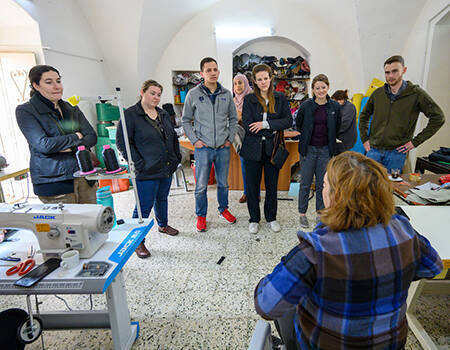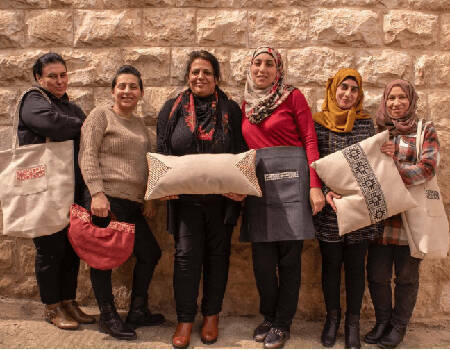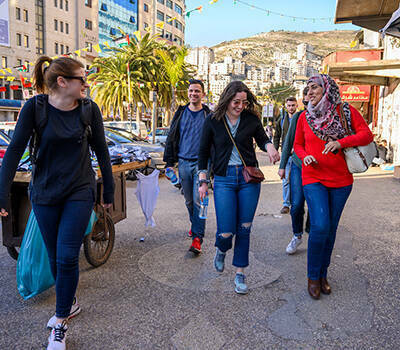Business on the Frontlines continues work with Palestinian artisans

The West Bank city of Jenin is an area plagued by violence and destruction. It is here that the University of Notre Dame’s Meyer Business on the Frontlines Program works with Palestinian women artisans to create economic opportunities for themselves and their families.
Notre Dame MBA students enrolled in Frontlines courses work in the West Bank and with communities around the world that have suffered violence, poverty and prejudice.
For the past six years, the Frontlines program at Mendoza College of Business has partnered with the nonprofit social enterprise Child’s Cup Full (CCF), which empowers talented refugee and low-income artisans in the West Bank through its two brands, Darzah, women’s ethical fashion accessories, and Zeki Learning, children’s educational toys.
Darzah and Zeki Learning employ some 40 Palestinian women as full-time and part-time artisans, including Rasha, whose family has lived in Jenin Camp for 75 years. On July 3, Israeli troops conducted a two-day military operation in the city.

“Her home was destroyed in the attack, and family members of three other artisans were injured and lost their homes,” said CCF founder Janette Habashi, who created the brands. “Destroyed roads also made it difficult for the artisans to reach neighboring towns where their raw materials are sourced.”
As the destruction became clear, CCF and Frontlines increased their collaboration and support. CCF created safe havens for artisans and their families at its center and in churches in Zababdeh, which is about 6 miles from Jenin Camp.
“Lines of communication were down, and we could not connect to our artisans or their families,” Habashi said. “It took us two days to reach Rasha, and we were relieved to hear her voice, but the situation was terrible for her family.”
Kelly Rubey, assistant teaching professor for the Business on the Frontlines MBA course, visited the West Bank with a Notre Dame team in 2022. The team worked closely with Notre Dame International’s safety and security team on campus and the Jerusalem Global Gateway, who monitor these events for students, faculty and staff. The small group, including three graduate students and two alumni, was hosted by Rasha’s family.

“They were such generous hosts, and the six of us felt so welcomed by everyone in the camp,” Rubey said.
“Working for CCF gives the artisans purpose — an opportunity to share both their culture and their skills,” she said. “There is so much dignity and empowerment in the work they do.”
Understanding the complexities of operating a business amid ongoing West Bank violence prompted students several years ago to recommend a working CCF advisory board in an effort to increase sales and opportunities. Notre Dame alumni were among the first contributors. This summer, they hired a new employee to lead those efforts.
Now in its 16th year, the Meyer Business on the Frontlines Program addresses pressing issues worldwide, including post-conflict rehabilitation, poverty, illicit economies, isolation and prejudice. Notre Dame MBA and other graduate students and faculty have worked on more than 90 projects in over 35 countries through a three-pronged approach that combines the rigor of business, the best of academia and a belief in the dignity of work for all people.
Frontlines partners with international humanitarian organizations, local nongovernmental organizations like CCF, Fortune 500 companies and religious organizations to find local solutions that create jobs or set the conditions for economic growth. It’s estimated that thousands of people now have livelihoods as a direct result of these partnerships.
“The attack on Jenin only increased our motivation to continue our work in the West Bank and served as a reminder for CCF and the advisory board of the need to create new employment opportunities,” Rubey said. “Clearly, the days of oppression and limited economic opportunity are far from over for Palestinians in the West Bank.”
Learn more about the partnership between Business on the Frontlines and Child’s Cup Full here.
Watch “Fighting to Rebuild Communities,” featuring BOTFL.
Latest International
- Prioritizing prenatal care may decrease low birth weight outcomes in The Gambia, Notre Dame research findsA new study co-authored by University of Notre Dame researchers highlights the importance of prenatal care for improving the health of mothers and newborns, providing evidence that can inform policy.
- Navigating the waters of peace: Researchers address challenges, opportunities in implementation of Colombia's Peace AgreementNearly half of the commitments outlined in Colombia's historic peace accord face significant challenges and may not happen in time unless policymakers make several key interventions, warns a new report from Notre Dame's Peace Accords Matrix. The report offers a blueprint to salvage an accord that has lagged behind its implementation deadlines, putting its legacy at risk. It highlights timely fixes that can strengthen the agreement.
- Partial peace deals may facilitate comprehensive accords, offering roadmap for policymakers, practitionersPartial peace agreements — deals that address targeted issues on the way to larger comprehensive accords — could provide a blueprint for peacebuilding policymakers and practitioners, according to new University of Notre Dame research.
- CANCELED: University to host Cardinal Pedro Barreto of Peru and Cardinal Peter Turkson of Ghana as part of Notre Dame ForumAs part of the 2024-25 Notre Dame Forum, Cardinal Pedro Ricardo Barreto Jimeno, S.J., of Peru and Cardinal Peter Kodwo Appiah Turkson of Ghana will visit the University of Notre Dame to participate in a conversation with President Rev. Robert A. Dowd, C.S.C., at 11:30 a.m. April 25 in the Smith Ballroom of the Morris Inn. The conversation is open to the public and will also be livestreamed for both Spanish-speaking and English-speaking audiences.
- ‘Who the messenger is matters’: Cultural leaders can positively influence population growthFertility rates across the world have been steadily dropping since 1950. Pinpointing the reasons is at the heart of Lakshmi Iyer's work as a professor of economics and global affairs. Her research exemplifies the kind of population-level research that Notre Dame Population Analytics (ND Pop), a new research initiative at the University, seeks to foster.
- Lessons from Venezuela’s democratic collapse: How opposition movements can defy autocratic leadersLaura Gamboa, a political scientist at the University of Notre Dame, explores how opposition movements navigate authoritarian regimes in a study of Venezuela's political transformation. The research analyzes the effectiveness of various strategies, including electoral participation, in the face of eroding democratic norms.













